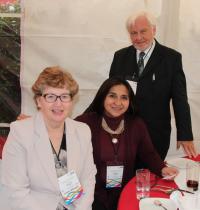PASCAL Associates at the UNESCO Learning Cities meeting in Mexico City
The UNESCO Institute for Lifelong Learning (UIL) and the Government of Mexico City invited the Global Network of Learning Cities (GNLC) members and experts in the field to a two day meeting in Mexico City on the 19th and 20th November with overarching themes of:
- Review the progress on the development of case studies; the establishment and expanding of the Global Network of Learning Cities (GNLC), and the preparation of the Second International Conference on Learning Cities.
- International High Level Forum on Learning Cities.
 Arne Carlsen, Director of UIL, reminded us that the initiative is about developing inclusive, sustainable learning cities, towns, villages and local communities. It is acknowledged that in 2008, for the first time in history, more than half of the world’s population lived in cities. However, cities do not sit in isolation from surrounding regional locations.
Arne Carlsen, Director of UIL, reminded us that the initiative is about developing inclusive, sustainable learning cities, towns, villages and local communities. It is acknowledged that in 2008, for the first time in history, more than half of the world’s population lived in cities. However, cities do not sit in isolation from surrounding regional locations.
[Click the image on the right for expanded view of participants]
Considerable progress has been made since the first International Conference on Learning Cities, held in Beijing, October 2013. Since the 550 delegates from 120 countries attended the conference,” the practice of building learning cities has accelerated”. In particular the GNLC is now well established and is seen as an “international platform to share victories, failures; what went well, and what did not go well”.
Professor Norman Longworth presented on the progress to date of coordinating and editing the Learning City case studies to be finalised for a publication to be launched at the Second International Conference on Learning Cities to be held in 2015. Professor Longworth summarised the similarities and differences, including challenges involved when comparing megacities (10 million plus population) with medium (1-5 million population) and small cities (under 1 million population). Norman reminded us that even though each case study used different themes, the one defining element that made them Learning Cities is that learning is the “fuel for the engine of city growth”. Thus enterprising cities, sustainable cities, and cities tackling poverty, inequality and crime can use learning as a focus. Arne Carlsen reiterated that “learning is at the heart of work, inclusion and sustainability”. Practitioners from a selection of case studies were able to talk about their local contexts and this provided opportunity for dialogue, networking and further contributions to enhance UNESCO’s Key Features of Learning Cities. For example, PASCAL Associate, Judith James presented on the progress of Swansea Bay Entrepreneurial Learning City Region. I am pleased to report that the City of Melton in Australia is also one of the case studies.
Monitoring and evaluation was also a key theme. Ms Mo Wang, from UIL, updated participants on the development of the Key Features of Learning Cities. She outlined the rationale and how the document is being adapted to local contexts, including a case study on how 34 UNESCO Key Features of Learning Cities have been adopted and adjusted into a Beijing Learning City Index. I was able to present on my accumulated experience in evaluating and monitoring Australian Learning Cities, the lessons learnt, and how the Learning as a Driver for Change research work, led by the Australian Centre of Excellence in Local Government, connects to the UNESCO framework.
A summary of the presentations and key messages is located at http://learningcities.uil.unesco.org/resources/conferences
Finally, I thank UIL and The Mexican City Government for providing us with the opportunity to share our combined experiences and the chance to prepare for what is promising to be an exciting Second International Conference on Learning Cities. The conference will take place in Mexico City - date to be confirmed shortly.
PASCAL looks forward to co-operating with UNESCO in the next phase of work.
 Printer-friendly version
Printer-friendly version- Login to post comments
- 232 reads





